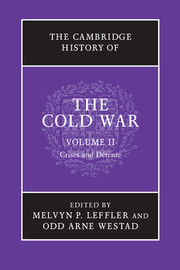Book contents
- Frontmatter
- 1 Grand strategies in the Cold War
- 2 Identity and the Cold War
- 3 Economic aspects of the Cold War, 1962–1975
- 4 The Cuban missile crisis
- 5 Nuclear competition in an era of stalemate, 1963–1975
- 6 US foreign policy from Kennedy to Johnson
- 7 Soviet foreign policy, 1962–1975
- 8 France, “Gaullism,” and the Cold War
- 9 European integration and the Cold War
- 10 Détente in Europe, 1962–1975
- 11 Eastern Europe: Stalinism to Solidarity
- 12 The Cold War and the transformation of the Mediterranean, 1960–1975
- 13 The Cold War in the Third World, 1963–1975
- 14 The Indochina wars and the Cold War, 1945–1975
- 15 The Cold War in the Middle East: Suez crisis to Camp David Accords
- 16 Cuba and the Cold War, 1959–1980
- 17 The Sino-Soviet split
- 18 Détente in the Nixon–Ford years, 1969–1976
- 19 Nuclear proliferation and non-proliferation during the Cold War
- 20 Intelligence in the Cold War
- 21 Reading, viewing, and tuning in to the Cold War
- 22 Counter-cultures: the rebellions against the Cold War order, 1965–1975
- 23 The structure of great power politics, 1963–1975
- 24 The Cold War and the social and economic history of the twentieth century
- Bibliographical essay
- Index
- References
21 - Reading, viewing, and tuning in to the Cold War
Published online by Cambridge University Press: 28 September 2010
- Frontmatter
- 1 Grand strategies in the Cold War
- 2 Identity and the Cold War
- 3 Economic aspects of the Cold War, 1962–1975
- 4 The Cuban missile crisis
- 5 Nuclear competition in an era of stalemate, 1963–1975
- 6 US foreign policy from Kennedy to Johnson
- 7 Soviet foreign policy, 1962–1975
- 8 France, “Gaullism,” and the Cold War
- 9 European integration and the Cold War
- 10 Détente in Europe, 1962–1975
- 11 Eastern Europe: Stalinism to Solidarity
- 12 The Cold War and the transformation of the Mediterranean, 1960–1975
- 13 The Cold War in the Third World, 1963–1975
- 14 The Indochina wars and the Cold War, 1945–1975
- 15 The Cold War in the Middle East: Suez crisis to Camp David Accords
- 16 Cuba and the Cold War, 1959–1980
- 17 The Sino-Soviet split
- 18 Détente in the Nixon–Ford years, 1969–1976
- 19 Nuclear proliferation and non-proliferation during the Cold War
- 20 Intelligence in the Cold War
- 21 Reading, viewing, and tuning in to the Cold War
- 22 Counter-cultures: the rebellions against the Cold War order, 1965–1975
- 23 The structure of great power politics, 1963–1975
- 24 The Cold War and the social and economic history of the twentieth century
- Bibliographical essay
- Index
- References
Summary
For many years the historiography of Cold War culture was dominated by two rather parochial clichés. The first held that studying the Cold War and culture meant discussing the impact of the McCarthy-era purges on cultural production in the United States; the second, that it meant the study of films or literature with explicit Cold War content. Recent scholarship has taken a much broader approach. Within the United States, the Cold War has provided the dominant framework for thinking about culture in the 1950s. President Harry S. Truman’s notion of containment is now as readily applied to the lives of American women of the era as to their government’s relations with the Soviet Union. Beyond this, the cultural Cold War has emerged as a major concern of international history. The literature, film, and broadcasting of the Cold War period is at last being understood by historians, as it was by protagonists, not only as a product of the politics of the era but also as a front in the Cold War as real as that which divided Berlin, bisected Korea, or ran through the straits of Miami. With this in mind, this chapter will consider, first, how the governments of East and West shaped culture during the Cold War and, then, how writers, filmmakers, and broadcasters responded to the conflict. The analysis will focus on the middle years of the conflict, but the conclusion will examine the ways in which these influences played out in the 1980s.
- Type
- Chapter
- Information
- The Cambridge History of the Cold War , pp. 438 - 459Publisher: Cambridge University PressPrint publication year: 2010
References
- 3
- Cited by

